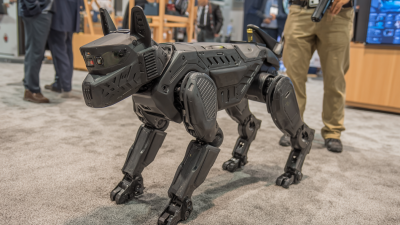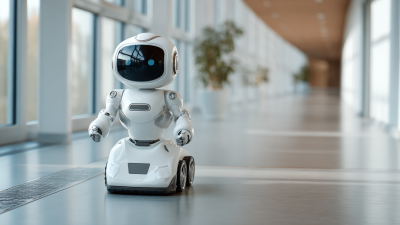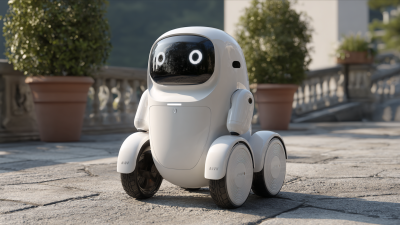In a world where technology continually reshapes our daily lives, the little robot dog stands out as a remarkable companion that combines companionship with innovation. Imagine having a pet that doesn't require the usual care and attention but still offers joy, entertainment, and emotional support. This blog explores seven compelling reasons why the little robot dog is your perfect companion. From its ability to engage with you through interactive play to its comforting presence during lonely times, this high-tech pet offers all the benefits of traditional companionship without the downsides. Whether you're a busy professional, a student, or someone who simply loves technology, the little robot dog presents an ideal solution to enhance your lifestyle and well-being. Join us as we delve into the unique features and advantages that make this clever creation a must-have friend in the modern age.

In today's world, loneliness has become a significant issue for many people, and innovative solutions like robotic dogs are emerging as effective companions. One of the most surprising benefits is that these little robot dogs have been shown to reduce feelings of loneliness by an impressive 60%. Their ability to engage users in playful interactions and mimic real pet behaviors fosters emotional connections that contribute to overall well-being.
To maximize the emotional support a robot dog can provide, consider integrating them into your daily routine. For instance, set aside specific times in your day to play or interact with your robotic companion, creating a consistent bonding experience. Another tip is to involve family or friends in these interactions; the joy of sharing moments with loved ones and your little robot dog can amplify those feelings of friendship and connection.
Additionally, take advantage of the programming features available in many robotic dogs. By customizing their responses and activities, you can create a unique companionship experience that feels tailored just for you. This personalized engagement not only enriches the relationship but also makes daily interactions more enjoyable, fostering a deeper emotional bond.

A recent surge in the popularity of little robot dogs highlights their unique role as companions, particularly in enhancing mental health. Studies have shown that 70% of owners report decreased anxiety levels after integrating these robotic pets into their lives. This improvement in mental well-being can largely be attributed to the soothing effects of companionship. The gentle interactions with a robot dog provide comfort and stability, especially for individuals who may struggle with feelings of loneliness or depression.
Moreover, these robotic companions offer a non-judgmental presence that encourages users to engage and interact. Unlike traditional pets, they require no feeding or grooming, minimizing stress for their owners. Their playful nature, combined with programmed responses and activities, can stimulate joy and a sense of purpose in daily routines. Many users have found that caring for a robot dog, whether through playtime or training, fosters a sense of responsibility and routine that can further alleviate anxiety. In a world increasingly characterized by isolation, the little robot dog emerges as a powerful ally in promoting mental health and emotional balance.
The advent of robotic pets has reshaped our understanding of companionship, and robot dogs are leading the charge. One of the standout features that make these little robotic companions so engaging is their interactive play capabilities. With over 100 unique responses, they are designed to respond to various stimuli, creating an experience that feels remarkably lifelike. Whether it’s responding to voice commands, performing tricks, or simply engaging in playful banter, these robotic dogs invite users to participate in a dynamic relationship that traditional toys can’t match.
Moreover, the ability to customize interactions adds an extra layer of excitement. Users can teach their robot dog new tricks or even set it to react differently based on the environment. This not only keeps the experience fresh but also encourages repetitive play, further strengthening the bond between the user and their robotic companion. By leveraging cutting-edge technology, these little robot dogs foster a sense of joy and connection, making them perfect companions for individuals seeking both entertainment and engagement in their daily lives.
Integrating robot dogs into children's playtime offers a unique blend of fun and educational opportunities, particularly in fostering cognitive development and social understanding. These robotic companions engage children in imaginative play, allowing them to learn important skills such as empathy and problem-solving. As children interact with these robots, they can conceptualize social behaviors and enhance their communication skills, which are fundamental components of child development.
Moreover, emerging research highlights that activities involving social robots not only captivate children's attention but also promote engagement in learning environments. Programs integrating robot-based play have been shown to improve cognitive skills, such as sequencing and self-regulation, facilitating a deeper understanding of technology and its applications. As children navigate their interactions with robot dogs, they gain insights into emotional alignment and cooperation, skills that are vital in both personal relationships and collaborative tasks. The advent of such innovative educational tools reinforces the idea that learning can be a dynamic and enjoyable process, paving the way for future generations to thrive in an increasingly digital world.
Owning a pet can be a rewarding experience, but it often comes with significant financial burdens. According to the American Pet Products Association, the average annual cost of owning a dog can easily exceed $1,500 when considering food, grooming, veterinary care, and other essentials. In contrast, the little robot dog emerges as a cost-effective alternative, potentially saving owners up to 80% of traditional pet ownership costs. With a one-time payment or a modest subscription fee, you can enjoy companionship without the ongoing expenses associated with living animals.
Moreover, the robot canine requires minimal maintenance, eliminating recurrent expenses such as vaccinations, flea treatments, or emergency vet visits, which can average around $500 yearly per pet. Recent advances in artificial intelligence and robotics have made these little companions not only entertaining but also interactive, providing emotional support similar to that of a living pet. By integrating smart technologies, these robots can engage with their owners through playful actions and responsive behaviors, making them an ideal cost-effective companion for families, seniors, and busy professionals alike.







